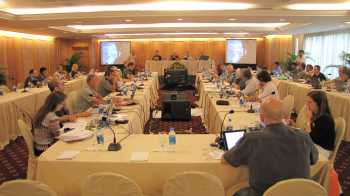The Sixth Meeting of ACAP's Committee (AC6) closed yesterday evening with a vote of thanks extended to the Government of Ecuador for acting as hosts. The general consensus among attending delegates and observers was that the meeting had been a successful one, with a number of important issues addressed and advanced.
Among the decisions made was to amalgamate the Breeding Sites and Status & Trends Working Groups into a new Population and Conservation Status Working Group (PaCSWG) with new Terms of Reference. Drs Rosemary Gales (Australia) and Richard Phillips (United Kingdom) were appointed Co-convenors of the new working group and Drs Flavio Quintana (Argentina) and Henri Weimerskirch (France) were appointed as Vice-co-convenors.
Peru confirmed its agreement to host the Fourth Session of the Meeting of Parties (MoP4) in Lima, Peru next year, to be held during the month of May. This will be the first time ACAP meets in Peru, as it continues towards holding meetings in a full suite of South American Parties to the Agreement.
Following a notice of its intention to nominate the species to MoP4 by Spain, the Advisory Committee confirmed its view that the Critically Endangered Balearic Shearwater Puffinus mauretanicus was a strong candidate for listing on Annex 1 of the Agreement. This species breeds only on the Spanish Balearic Islands in the Mediterranean. If listed, as expected, it will be the first shearwater to be included within the Agreement and will bring with it new regions of the World and new range states, and new types of threats for the Advisory Committee and its working groups to consider.

Balearic Shearwater. Photograph by Daniel Oro

Pink-footed Shearwater. Photograph by Peter Hodum
Chile stated its intention at AC6 to work towards a nomination of the Pink-footed Shearwater P. creatopus to the Agreement. This Vulnerable species is a trans-equatorial migrant and a Chilean breeding endemic. Formal nomination would not be expected before MoP5, due to be held in about 2015. In addition, Ecuador expressed its desire to nominate the Critically Endangered Galapagos Petrel Pterodroma phaeopygia, which breeds only in its Galapagos Islands. The Advisory Committee considered that formal nominations to sessions of the Meeting of Parties should be accompanied by both species action plans and draft ACAP Species Assessments. ACAP offered the resources of its Secretariat to help with the drafting of the latter documents.

Sixth Meeting of the ACAP Advisory Committee in session
The ACAP Secretarial staff, interpreters and staff from Unipark Hotel in Guayaquil were thanked for their support as the meeting closed. The Advisory Committee thanked the Chair, Dr Marco Favero for his stewardship of the meeting.
John Cooper, ACAP Information Officer, 3 September 2011

 Français
Français  English
English  Español
Español